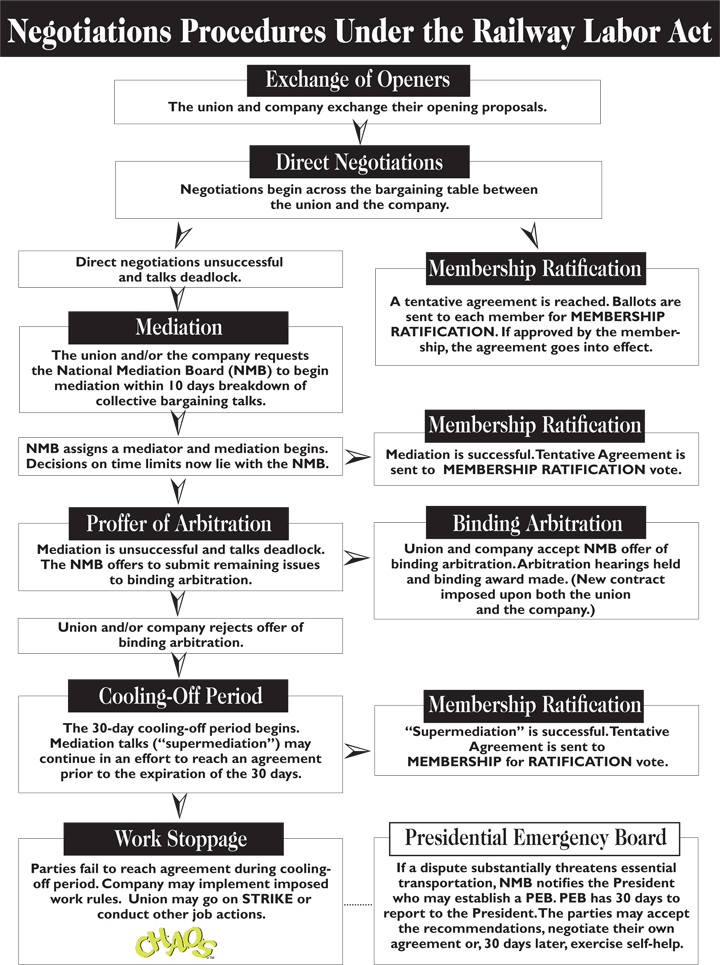Negotiations Process Summary
2012-2016 Contract
RLA Section 6 Negotiations Process Chart
Our negotiations will occur in unique circumstances. All the Unions at United Airlines will be in negotiations simultaneously, with our Contract talks scheduled to begin in the spring of 2009. Contracts negotiated under the Railway Labor Act (RLA) do not expire, they become amendable and our current Contract stays in place during the negotiations process. Our Contract is amendable January 7, 2010. We’re demanding an “On-Time Agreement” from United management; that would mean our new Contract would be in place by this date.
During bankruptcy we negotiated an early opener provision as part of our 2005-2010 Agreement. We have the right to start the negotiations early by serving the Company with written notice of the intent to change the Contract 270 days prior to the amendable date. Under this provision Direct Negotiations (negotiations between AFA and management) will begin in April 2009.
After compiling and reviewing all your feedback, our opening proposal (Opener) will be finalized during March and presented to the AFA United Master Executive Council (MEC) for their consideration in the beginning of April. After the MEC approves our Opener, we will exchange opening proposals with the Company. It’s a safe bet we won’t like management’s Opener at all, but we will negotiate in good faith when talks begin. Our Negotiating Committee will conduct another Roadshow and visit all Councils again to review both Openers with you.
Direct Negotiations
Direct Negotiations with the Company will resume upon returning from that Roadshow and continue throughout the spring and summer of 2009. If a Tentative Agreement is reached, it would be presented to the MEC for their consideration. If approved by the MEC, the Tentative would be presented to you for a ratification vote.
Mediation & the National Mediation Board
If a Tentative Agreement has not been achieved by August 7, 2009 our Contract states AFA and United will jointly petition the National Mediation Board (NMB) to begin mediation. The NMB, whose three members are appointed by the President of the United States, is the federal agency that appoints mediators to assist the parties with productive dialog on their negotiations issues. The mediator establishes when and where the parties will meet and may recess a case from time to time if it is deemed appropriate. There is no time limit for the mediation process although our Solidarity can encourage progress. Mediation continues until an agreement is reached or until the NMB determines that further mediation would be fruitless due to an impasse. The NMB uses the mediation process to foster agreements and to avoid a resort to "Self Help" whenever possible. For the Union, Self Help means engaging in activities that may inflict economic harm on the company, up to and including a strike. For the Company it means Self Help includes the right to unilaterally impose their changes to our Contract, or to lock us out.
This mediation process continues until a Tentative Agreement is reached or talks deadlock. When the NMB believes that mediation efforts will not result in an Agreement, the NMB conveys a “Proffer of Arbitration” to the parties, proposing to resolve the remaining issues in binding arbitration. During binding arbitration, hearings are held and an award made by the arbitrator. The award is binding and the new Contract is imposed upon both the Union and the Company, without a ratification vote. If either side rejects the “Proffer of Arbitration,” the NMB releases the parties from mediation and they enter a countdown to Self Help: the “30-day Cooling-Off Period.”
The 30-Day Cooling Off Period
During the cooling off period, the NMB invites the parties to further mediate the negotiations. These meetings are often referred to as “super mediation” and usually attended by one of the Board members of the NMB. Generally, these meetings are called at or near the end of the 30-day countdown to Self Help, with the Self Help deadline often providing a new incentive for the parties to reach an agreement. If no agreement is reached by the end of the Cooling-Off Period we would then be free to strike or employ other self-help tactics to put economic pressure on management to reach an agreement. Management would have a similar right to engage in self-help tactics – like a lockout or imposed work rules – to pressure the Flight Attendants to reach an agreement.
Presidential Emergency Board
The RLA gives the NMB one additional means for trying to resolve a negotiations dispute and avert a strike or a lockout. The NMB may notify the President of the United States that, in its judgment, an agreement cannot be reached and this may threaten to substantially interrupt interstate commerce and transportation. The President may then interrupt Self Help and appoint a "Presidential Emergency Board" ("PEB"), which has 30 days to conduct hearings with the parties to develop a proposed agreement. This is followed by another 30-day Cooling-Off Period. If either party rejects the PEB proposal, the parties may engage in Self Help at the end of this last 30-day Cooling-Off Period. Finally, Congress may also intervene and mandate an Agreement legislatively, ordering the parties to adopt the findings of the PEB. This is another reason we work to elect a President and members of Congress who understand the importance of ensuring Flight Attendants a fair opportunity to negotiate fair wages, benefits, retirement and work rules.
RLA Section 6 Negotiations Process Chart

Return to 2012-2016 Negotiations Home Page